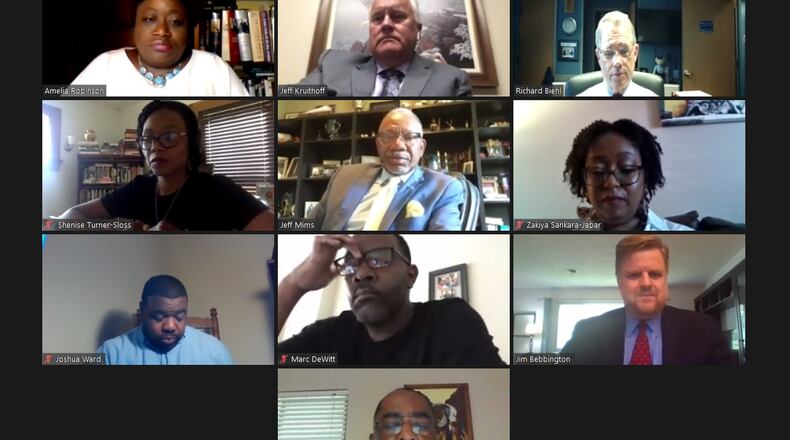“We can always improve our hiring practices,” said Springboro Police Chief Jeff Kruithoff. “We do put a lot of emphasis on hiring people for what their head has, not what their heart has. When people come in with college degree, quick-witted, appear to handle themselves well on their feet, we hire them because of what their head has and we don’t worry about what their heart has. We do need to spend just as much time knowing what their heart contains.”
Dayton considering declaring racism a public health crisis
Panelists included Dayton Police Chief Richard Biehl, Shenise Turner Sloss of Neighborhoods Over Politics, a training and advocacy organization, the Rev. Joshua Ward of Omega Baptist Church, Lawrence Burnley, University of Dayton’s vice president for diversity and inclusion, Springboro Police Chief Jeff Kruithoff, Dayton City Commissioner Jeff Mims, Dayton born activist Zakiya Sankara-Jabar of Brightbeam, a nonprofit network of education activists; and Marc DeWitt, Sinclair Community College and Community Police Council.
Dayton Daily News Community Impact Editor Amelia Robinson led panelists in a discussion of the current relationship between Dayton area police and the residents and what can be done to improve it.
Dayton mayor vows police changes; some black leaders skeptical
Some panelists like Burnley focused their answers and questions during the discussion on the understanding of the history of racism going back hundreds of years in America. Others like Sankara-Jabar directed their questions to both police chiefs and Mims on what current policies are in place to begin improving race relations in the community.
“When we say de-fund the police, what we mean is, shift the police budget to invest in areas of positivity in our community,” Sankara-Jabar said. “I know from being a 20-year resident in Dayton that there isn’t enough after school activities for young people. There isn’t enough investment in grocery stores and things that people need to live whole and better lives.”
Both police chiefs on the panel were asked about current screening of their own officers, policies on choke-holds and what kind of de-escalation training their departments have in place.
Lawmaker asks if ‘colored population’ not washing their hands as well as others behind COVID rates
Chief Biehl said there is deescalation training that is required by law in Ohio that is part of the basic curriculum that policy officers go through. He said de-escalation has been recently presented like a new concept that has never been thought of before.
“Any police officer that is quality understood that de-escalation was always an important option in responding to potential conflict,” Biehl said. “This is not a new concept, it’s been lifted up because of the, in some cases, very high profile cases where de-escalation was never considered.”
Lack of accountability and transparency when “bad apple” police situations do happen, was what Ward said has been the obstacle keeping him from having a confidence and trust
“I don’t hear any response with the bad apples,” Ward said. … I think transparency, if you are holding those officers accountable, would go a long way for somebody like me to even get to the place where I’m willing to listen and say ‘OK, I’m going to trust (the police) and let you all work it out.’”
The full panel discussion is available on the Dayton Daily News Facebook page.
In partnership between the Dayton Daily News and Dayton Metro Library, Robinson will host the next Courageous Conversations panel discussion on July 8 at 5 p.m. live on the Dayton Daily News Facebook page. The discussion will be based on the book “Me and White Supremacy: Combat Racism, Change the World and Become a Good Ancestor” by Layla F Saad.
Dayton Metro Library cardholders can download the book ahead of the event at https://www.overdrive.com/media/5008327/me-and-white-supremacy.
About the Author
